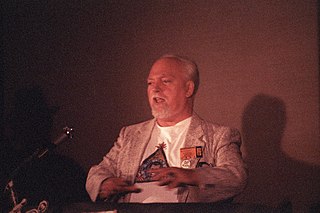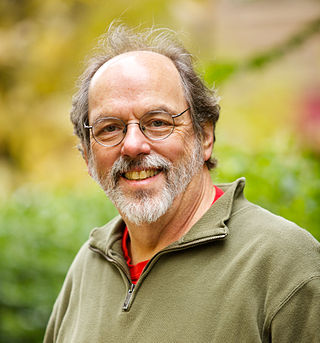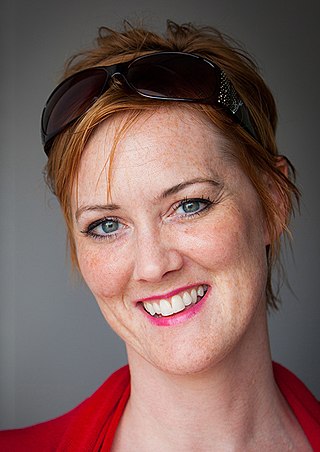Related Research Articles

Geoffrey Charles Ryman is a Canadian writer of science fiction, fantasy, slipstream and historical fiction. Ryman has written and published seven novels, including an early example of a hypertext novel, 253. He has won multiple awards, including the World Fantasy Award.
Interactive fiction (IF) is software simulating environments in which players use text commands to control characters and influence the environment. Works in this form can be understood as literary narratives, either in the form of Interactive narratives or Interactive narrations. These works can also be understood as a form of video game, either in the form of an adventure game or role-playing game. In common usage, the term refers to text adventures, a type of adventure game where the entire interface can be "text-only", however, graphical text adventure games, where the text is accompanied by graphics still fall under the text adventure category if the main way to interact with the game is by typing text. Some users of the term distinguish between interactive fiction, known as "Puzzle-free", that focuses on narrative, and "text adventures" that focus on puzzles.

Robert Anton Wilson was an American author, futurist, psychologist, and self-described agnostic mystic. Recognized within Discordianism as an Episkopos, pope and saint, Wilson helped publicize Discordianism through his writings and interviews. In 1999 he described his work as an "attempt to break down conditioned associations, to look at the world in a new way, with many models recognized as models or maps, and no one model elevated to the truth". Wilson's goal was "to try to get people into a state of generalized agnosticism, not agnosticism about God alone but agnosticism about everything."

Howard G. Cunningham is an American computer programmer who developed the first wiki and was a co-author of the Manifesto for Agile Software Development. Termed a pioneer, and innovator, he also helped create both software design patterns and extreme programming. He began coding the WikiWikiWeb in 1994, and installed it on c2.com on March 25, 1995, as an add-on to the Portland Pattern Repository. He co-authored a book about wikis, entitled The Wiki Way, and invented the Framework for Integrated Test.

Wiktionary is a multilingual, web-based project to create a free content dictionary of terms in all natural languages and in a number of artificial languages. These entries may contain definitions, images for illustration, pronunciations, etymologies, inflections, usage examples, quotations, related terms, and translations of terms into other languages, among other features. It is collaboratively edited via a wiki. Its name is a portmanteau of the words wiki and dictionary. It is available in 194 languages and in Simple English. Like its sister project Wikipedia, Wiktionary is run by the Wikimedia Foundation, and is written collaboratively by volunteers, dubbed "Wiktionarians". Its wiki software, MediaWiki, allows almost anyone with access to the website to create and edit entries.

MediaWiki is free and open-source wiki software originally developed by Magnus Manske for use on Wikipedia on January 25, 2002, and further improved by Lee Daniel Crocker, after which development has been coordinated by the Wikimedia Foundation. It powers several wiki hosting websites across the Internet, as well as most websites hosted by the Wikimedia Foundation including Wikipedia, Wiktionary, Wikimedia Commons, Wikiquote, Meta-Wiki and Wikidata, which define a large part of the set requirements for the software. MediaWiki is written in the PHP programming language and stores all text content into a database. The software is optimized to efficiently handle large projects, which can have terabytes of content and hundreds of thousands of views per second. Because Wikipedia is one of the world's largest and most visited websites, achieving scalability through multiple layers of caching and database replication has been a major concern for developers. Another major aspect of MediaWiki is its internationalization; its interface is available in more than 400 languages. The software has more than 1,000 configuration settings and more than 1,800 extensions available for enabling various features to be added or changed. Besides its usage on Wikimedia sites, MediaWiki has been used as a knowledge management and content management system on websites such as Fandom, wikiHow and major internal installations like Intellipedia and Diplopedia.

Interzone is a British fantasy and science fiction magazine. Published since 1982, Interzone is the eighth-longest-running English language science fiction magazine in history, and the longest-running British science fiction (SF) magazine. Stories published in Interzone have been finalists for the Hugo Awards and have won a Nebula Award and numerous British Science Fiction Awards.
Microformats (μF) are a set of defined HTML classes created to serve as consistent and descriptive metadata about an element, designating it as representing a certain type of data. They allow software to process the information reliably by having set classes refer to a specific type of data rather than being arbitrary.
Web scraping, web harvesting, or web data extraction is data scraping used for extracting data from websites. Web scraping software may directly access the World Wide Web using the Hypertext Transfer Protocol or a web browser. While web scraping can be done manually by a software user, the term typically refers to automated processes implemented using a bot or web crawler. It is a form of copying in which specific data is gathered and copied from the web, typically into a central local database or spreadsheet, for later retrieval or analysis.
The Public Whip is a parliamentary informatics project that analyses and publishes the voting history of MPs in the Parliament of the United Kingdom.

Mundane science fiction (MSF) is a niche literary movement within science fiction that developed in the early 2000s, with principles codified by the "Mundane Manifesto" in 2004, signed by author Geoff Ryman and the "2004 class" of the Clarion West Writers Workshop. The movement proposes "mundane science fiction" as its own subgenre of science fiction, typically characterized by its setting on Earth or within the Solar System; a lack of interstellar travel, intergalactic travel or human contact with extraterrestrials; and a believable use of technology and science as it exists at the time the story is written or a plausible extension of existing technology. There is debate over the boundaries of MSF and over which works can be considered canonical. Rudy Rucker has noted MSF's similarities to hard science fiction and Ritch Calvin has pointed out MSF's similarities to cyberpunk. Some commentators have identified science fiction films and television series which embody the MSF ethos of near-future realism.
The Financial Sanctions Unit of the Bank of England formerly administered financial sanctions in the United Kingdom on behalf of HM Treasury. It was in operation since before 1993, when it applied sanctions against the Government of Libya. More recently, since Libya became an ally of the United Kingdom, sanctions have been applied against those who allegedly fought against the Government of Libya at the time it was not an ally. Responsibility for the administration of Financial Sanctions in the UK transferred from the Bank of England to HM Treasury on 24 October 2007. In April 2016 HM Treasury set up the Office of Financial Sanctions Implementation, a new body whose mission is to "provide a high-quality service to the private sector, working closely with law enforcement to help ensure that financial sanctions are properly understood, implemented and enforced."

WikiLeaks is a non-profit media organisation and publisher of leaked documents. It is funded by donations and media partnerships. It has published classified documents and other media provided by anonymous sources. It was founded in 2006 by Julian Assange, an Australian editor, publisher, and activist. Since September 2018, Kristinn Hrafnsson has served as its editor-in-chief. Its website states that it has released more than ten million documents and associated analyses. WikiLeaks' most recent publication of original documents was in 2019 and its most recent publication was in 2021. From November 2022, numerous documents on the organisation's website became inaccessible. In 2023, Assange said that WikiLeaks is no longer able to publish due to his imprisonment and the effect that US government surveillance and WikiLeaks' funding restrictions were having on potential whistleblowers.

Heather Rose Brooke is a British-American journalist and freedom of information campaigner. Resident since the 1990s in the UK, she helped to expose the 2009 expenses scandal, which culminated in the resignation of Speaker of the House of Commons Michael Martin, dozens of MPs standing down in the 2010 general election and multiple MPs being jailed.
Open-notebook science is the practice of making the entire primary record of a research project publicly available online as it is recorded. This involves placing the personal, or laboratory, notebook of the researcher online along with all raw and processed data, and any associated material, as this material is generated. The approach may be summed up by the slogan 'no insider information'. It is the logical extreme of transparent approaches to research and explicitly includes the making available of failed, less significant, and otherwise unpublished experiments; so called 'dark data'. The practice of open notebook science, although not the norm in the academic community, has gained significant recent attention in the research and general media as part of a general trend towards more open approaches in research practice and publishing. Open notebook science can therefore be described as part of a wider open science movement that includes the advocacy and adoption of open access publication, open data, crowdsourcing data, and citizen science. It is inspired in part by the success of open-source software and draws on many of its ideas.

Francis Irving is a British software engineer, freedom of information activist and former CEO of ScraperWiki.

Julian Paul Assange is an Australian editor, publisher, and activist who founded WikiLeaks in 2006. He came to international attention in 2010 after WikiLeaks published a series of leaks from Chelsea Manning, a United States Army intelligence analyst: footage of a U.S. airstrike in Baghdad, U.S. military logs from the Afghanistan and Iraq wars, and U.S. diplomatic cables. Assange has won multiple awards for publishing and journalism.
QuickCode was a web-based platform for collaboratively building programs to extract and analyze public (online) data, in a wiki-like fashion. "Scraper" refers to screen scrapers, programs that extract data from websites. "Wiki" means that any user with programming experience can create or edit such programs for extracting new data, or for analyzing existing datasets. The main use of the website is providing a place for programmers and journalists to collaborate on analyzing public data.
Beautiful Soup is a Python package for parsing HTML and XML documents, including those with malformed markup. It creates a parse tree for documents that can be used to extract data from HTML, which is useful for web scraping.
References
- ↑ Julian, Todd (4 September 2006). "The UN as evidenced on the streets of Liverpool". Freesteel blog.
- ↑ Brook, Heather (8 June 2006). "Make it work for us, Ms Tullo". The Guardian.
- ↑ Grossman, Wendy (13 March 2008). "Is it possible for geeks to fix the United Nations?". The Guardian.
- ↑ ScraperWiki about page
- ↑ "Geoff Ryman: The Mundane Fantastic: Interview excerpts". Locus . January 2006. Retrieved 23 September 2007.